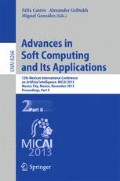Abstract
With increasing interest in sentiment analysis research and opinionated web content always on the rise, focus on analysis of text in various domains and different languages is a relevant and important task. This paper explores the problems of sentiment analysis and opinion strength measurement using a rule-based approach tailored to the Arabic language. The approach takes into account language-specific traits that are valuable to syntactically segment a text, and allow for closer analysis of opinion-bearing language queues. By using an adapted sentiment lexicon along with sets of opinion indicators, a rule-based methodology for opinion-phrase extraction is introduced, followed by a method to rate the parsed opinions and offer a measure of opinion strength for the text under analysis. The proposed method, even with a small set of rules, shows potential for a simple and scalable opinion-rating system, which is of particular interest for morphologically-rich languages such as Arabic.
Access this chapter
Tax calculation will be finalised at checkout
Purchases are for personal use only
Preview
Unable to display preview. Download preview PDF.
References
Pang, B., Lee, L., Vaithyanathan, S.: Thumbs up?: sentiment classification using machine learning techniques. In: Proceedings of the ACL 2002 Conference on Empirical Methods in Natural Language Processing, EMNLP 2002, vol. 10, pp. 79–86. Association for Computational Linguistics, Stroudsburg (2002)
Yu, H., Hatzivassiloglou, V.: Towards answering opinion questions: separating facts from opinions and identifying the polarity of opinion sentences. In: Proceedings of the 2003 Conference on Empirical Methods in Natural Language Processing, EMNLP 2003. Association for Computational Linguistics, Stroudsburg (2003)
Bruce, R., Wiebe, J.: Recognizing subjectivity: a case study in manual tagging. Nat. Lang. Eng. 5, 187–205 (1999)
Saleh, S., El-Sonbaty, Y.: A feature selection algorithm with redundancy reduction for text classification. In: 22nd International Symposium on Computer and Information Sciences, Turkey (2007)
Taboada, M., Brooke, J., Tofiloski, M., Voll, K., Stede, M.: Lexicon-based methods for sentiment analysis. Comput. Linguist. 37, 267–307 (2011)
Liu, B.: Sentiment Analysis and Opinion Mining. Morgan & Claypool Publishers (2012)
Turney, P.: Thumbs up or thumbs down? Semantic orientation applied to unsupervised classification of reviews. In: Proceedings of the 40th Annual Meeting of the Association of Computational Linguistics, Philadelphia, Pennsylvania (2002)
Kar, A., Mandal, D.: Finding opinion strength using fuzzy logic or web reviews. International Journal of Engineering and Industries 2(1) (2011)
Fu, G., Wang, X.: Chinese sentence-level sentiment classification based on fuzzy sets. In: Proceedings of the 23rd International Conference on Computational Linguistics: Posters, COLING 2010, pp. 312–319. Association for Computational Linguistics, Stroudsburg (2010)
Syed, A.Z., Aslam, M., Martinez-Enriquez, A.M.: Lexicon based sentiment analysis of urdu text using sentiunits. In: Sidorov, G., Hernández Aguirre, A., Reyes García, C.A. (eds.) MICAI 2010, Part I. LNCS, vol. 6437, pp. 32–43. Springer, Heidelberg (2010)
Abdul-Mageed, M., Diab, M., Korayem, M.: Subjectivity and sentiment analysis of modern standard arabic. In: Proceedings of the 49th Annual Meeting of the Association for Computational Linguistics: Human Language Technologies: Short Papers, HLT 2011, vol. 2. Association for Computational Linguistics, Stroudsburg, pp. 587–591 (2011)
Abbasi, A., Chen, H., Salem, A.: Sentiment analysis in multiple languages: Feature selection for opinion classification in web forums. ACM Trans. Inf. Syst. 26 (2008)
Rushdi-Saleh, M., Martin-Valdivia, M., Urena-Lopez, L., Perea-Ortega, J.: Oca: Opinion corpus for arabic. J. Am. Soc. Inf. Sci. Technol. 62, 2045–2054 (2011)
Habash, N.: Introduction to Arabic Natural Language Processing. Synthesis Lectures on Human Language Technologies. Morgan & Claypool Publishers (2008)
Ryding, K.: A Reference Grammar of Modern Standard Arabic. Reference Grammars. Cambridge University Press, New York (2006)
Ezzeldin, A.M., Kholief, M.H., El-Sonbaty, Y.: ALQASIM: Arabic language question answer selection in machines. In: Forner, P., Müller, H., Paredes, R., Rosso, P., Stein, B. (eds.) CLEF 2013. LNCS, vol. 8138, pp. 100–103. Springer, Heidelberg (2013)
Wilson, T., Wiebe, J., Hoffmann, P.: Recognizing contextual polarity in phrase-level sentiment analysis. In: Proceedings of the Conference on Human Language Technology and Empirical Methods in Natural Language Processing, HLT 2005, pp. 347–354. Association for Computational Linguistics, Stroudsburg (2005)
Wilson, T., Hoffmann, P., Somasundaran, S., Kessler, J., Wiebe, J., Choi, Y., Cardie, C., Riloff, E., Patwardhan, S.: Opinionfinder: a system for subjectivity analysis. In: Proceedings of HLT/EMNLP on Interactive Demonstrations, HLT-Demo 2005, pp. 34–35. Association for Computational Linguistics, Stroudsburg (2005)
Riloff, E., Wiebe, J.: Learning extraction patterns for subjective expressions. In: Proceedings of the 2003 Conference on Empirical Methods in Natural Language Processing, EMNLP 2003, pp. 105–112. Association for Computational Linguistics, Stroudsburg (2003)
ALTEC: Arabic mpqa subjective lexicon (2012), http://www.altec-center.org/
Author information
Authors and Affiliations
Editor information
Editors and Affiliations
Rights and permissions
Copyright information
© 2013 Springer-Verlag Berlin Heidelberg
About this paper
Cite this paper
Oraby, S., El-Sonbaty, Y., Abou El-Nasr, M. (2013). Finding Opinion Strength Using Rule-Based Parsing for Arabic Sentiment Analysis. In: Castro, F., Gelbukh, A., González, M. (eds) Advances in Soft Computing and Its Applications. MICAI 2013. Lecture Notes in Computer Science(), vol 8266. Springer, Berlin, Heidelberg. https://doi.org/10.1007/978-3-642-45111-9_44
Download citation
DOI: https://doi.org/10.1007/978-3-642-45111-9_44
Publisher Name: Springer, Berlin, Heidelberg
Print ISBN: 978-3-642-45110-2
Online ISBN: 978-3-642-45111-9
eBook Packages: Computer ScienceComputer Science (R0)

